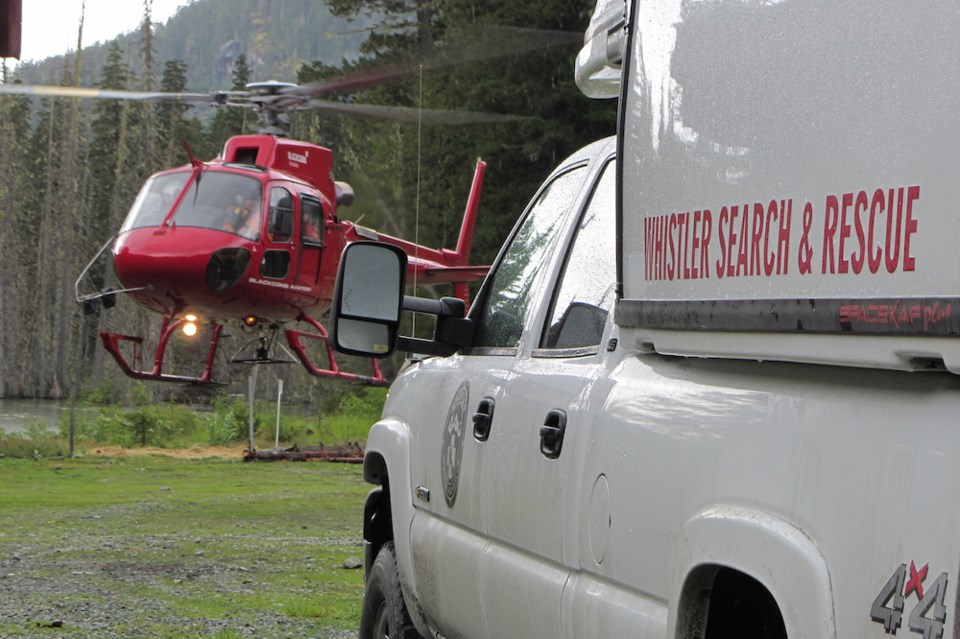Local search and rescue volunteers had a busy start to the May long weekend, after spending much of their Saturday extricating an injured BASE jumper near Lillooet.
Volunteers were first alerted to a parachute incident about 12 kilometres west of Lillooet at around 9 a.m. on May 22, said Pemberton Search and Rescue Society (PSAR) president Pete Schimek.
BC Ambulance Services initially flagged Lillooet Road Rescue to respond to the call. "I got patched in through the Emergency Coordination Center; we decided that [Lillooet Road Rescue] would probably be the quickest to get there so we just had them find out where the scene was and make an assessment," Schimek said.
"From conversation with Lillooet Road Rescue, they basically informed me that this person had wound up 300 metres off slope, had likely [fractured their femur], and that the easiest way to get them down would be via long-line rescue."
Rescuers from PSAR's bases in Lillooet and Pemberton attended, while members of Whistler Search and Rescue were brought in under a mutual aid agreement to carry out the long-line rescue.
According to Schimek, the incident took place at a rock slide area that appears to be "the new BASE jumping hotspot."
The subject of the search was part of a group of jumpers who were attempting the feat in squirrel suits, Schimek said. The BASE jumper appeared to have an issue deploying their chute during the third of the group's six planned jumps of the day. According to reports, the individual "came hard, clipped a fir tree and basically piled in," Schimek explained.
The individual reportedly suffered severe leg injuries including a broken femur in the crash, and was immediately transported to the Whistler Health Care Centre for treatment.
Calls remain steady for Pemberton Search and Rescue in 2021
Saturday's call was the only long weekend incident PSAR had been alerted to as of late Sunday afternoon. That lines up with a wider trend that's seen PSAR's call volume remain steady in recent months, in stark contrast with the massive spike search and rescue volunteers across B.C. had predicted to see heading into the winter.
"[Search and rescue teams] are busy elsewhere, but for us, it doesn't seem to make it up here," Schimek said. "For whatever reason, it seems to stop in Whistler. Either people get smarter as they go through Whistler or they get more sure as they go through Whistler. We've been pretty fortunate, given the fact that a lot of teams are hitting record years and we're kind of on the same trajectory as most other years."
Prior to Saturday's incident, PSAR had received 15 calls in 2021, compared to seven during the same period last year.
Due to a complete "dead period of about two to three months" during the onslaught of the COVID-19 pandemic in 2020, "It's not fair to gauge this year versus last year, up to this point," Schimek said. "But I think if you look at two years ago to where we are now, we're probably about the same," in terms of call outs.
Schimek recalled a prediction he made to Pique in December 2020: That search and rescue calls would result in “a full-time, unpaid job for us this winter."
Fortunately for PSAR, that anticipated spike never came to fruition— despite an anecdotal increase in backcountry users, he said. With that in mind, "We are not bracing ourselves for a busy summer," Schimek added. "I was bracing myself for a busy winter and it was pretty average."
He continued, "The sheer volume of people [recreating in the Duffey area] was something that I've never seen before, and would have never expected to see. Given the fact that we had these massive numbers of people up there, everybody seemed to play pretty safe, and we had very little extra activity ... You would expect a much higher call volume based on the sheer amount of people up there, but it never did happen. So I'm done making predictions."
And if that spike does come this summer? "We're well-staffed and capable of handling whatever comes our way," Schimek said.




